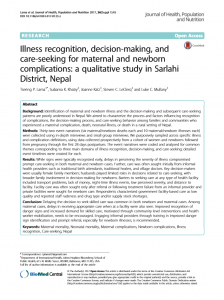
Identification of maternal and newborn illness and the decision-making and subsequent care-seeking patterns are poorly understood in Nepal. We aimed to characterize the process and factors influencing recognition of complications, the decision-making process, and care-seeking behavior among families and communities who experienced a maternal complication, death, neonatal illness, or death in a rural setting of Nepal.
Thirty-two event narratives (six maternal/newborn deaths each and 10 maternal/newborn illnesses each) were collected using in-depth interviews and small group interviews. We purposely sampled across specific illness and complication definitions, using data collected prospectively from a cohort of women and newborns followed from pregnancy through the first 28 days postpartum. The event narratives were coded and analyzed for common themes corresponding to three main domains of illness recognition, decision-making, and care-seeking; detailed event timelines were created for each.
Delaying the decision to seek skilled care was common in both newborn and maternal cases. Among maternal cases, delays in receiving appropriate care when at a facility were also seen. Improved recognition of danger signs and increased demand for skilled care, motivated through community level interventions and health worker mobilization, needs to be encouraged. Engaging informal providers through training in improved danger sign identification and prompt referral, especially for newborn illnesses, is recommended.